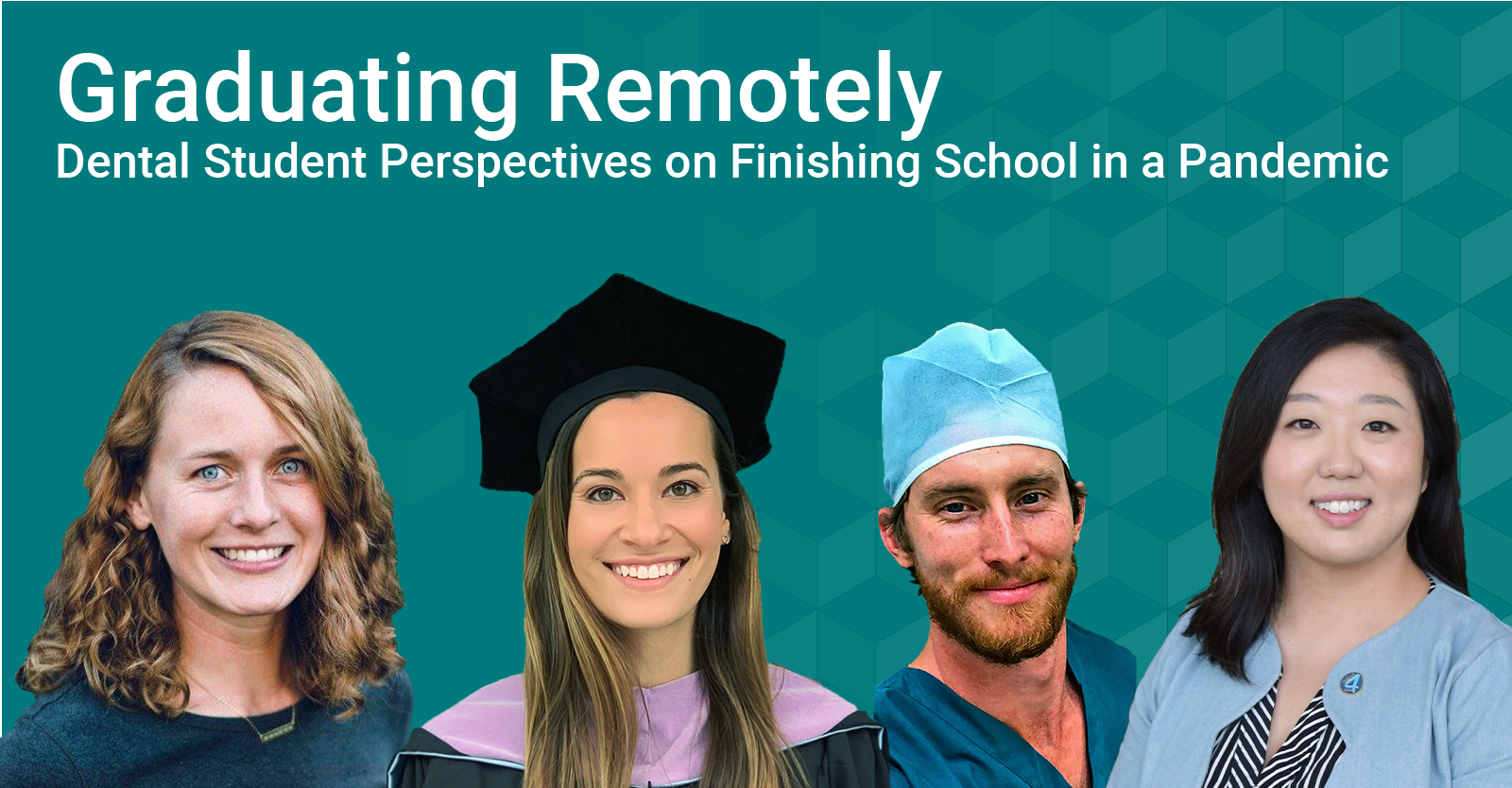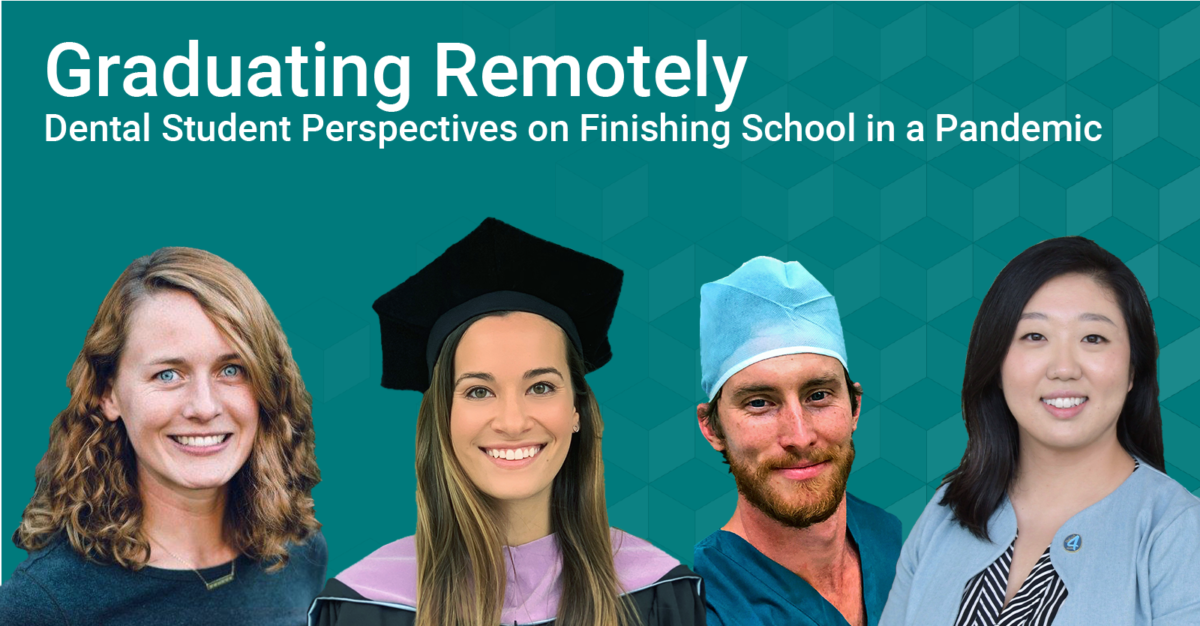Remote graduation has been a melancholy reality for the class of 2020. It’s nearly impossible to replace the feeling of joining your classmates to celebrate years of hard work and dedication. And, for many, graduation will be the last time that they see one another.
We spoke with recent graduates of the East Carolina University School of Dental Medicine and the University of North Carolina Adams School of Dentistry to learn what finishing school and graduating remotely was like for them.
Both UNC and ECU’s dental schools released students a day early for spring break, which quickly extended into an indefinite cancellation of classes and clinical work.

“I was on a rotation at one of our community service learning centers in Sylva, North Carolina,” said ECU graduate Dr. Jiwon Lim. “That week of spring break felt normal, then they started telling us every two weeks that we were out of clinic for another two weeks. It stretched into April and that’s when I realized that this is pretty serious.”
At UNC, students similarly eased into the realization that they might miss the entirety of their final semester of school.
“We got the Friday before spring break off and were under the impression that maybe we’d get an extra week and then we would be back,” said UNC graduate Dr. Brittany Klein. “Then it became increasingly apparent that we wouldn’t be going back at all.”
Educators at all levels, from daycare to doctoral programs, scrambled to develop remote course plans as schools cancelled in-person classes. For dental schools, especially when it came to students in their final semesters, there was no replacing the value of in-person learning.
“We were at a time in our education where everything was done in person, and there is simply no substitute for that. You can’t do it virtually,” said ECU graduate Dr. Dakota Peachee.
Lim explained that ECU eases into the clinical setting. In the second half of the second year, students begin performing basic procedures, like cleanings and treatment planning. Then, in the third year, students are in the clinical setting for three days a week. In the fourth year, students spend five days a week in clinical settings, with little to no traditional lecture-style coursework.
The timeline for UNC dental students is very similar.
“A lot of our work in the fourth year is finishing up those complex cases for people who have been with you for years,” said UNC graduate Dr. Anne Dorsey. “So, you’ve gotten them through the control phase, taking care of their cavities and oral hygiene. And you’ve gotten them to a place where you are actually replacing teeth so they can feel comfortable with their smile.”
For the students we spoke to, missing the final months of patient treatment was the hardest part of finishing school remotely.
“We have been with many of our patients for a long time, working through complex treatment plans that we should have wrapped up this semester,” said Klein. “Not getting to finish their treatment or say goodbye — and on top of that, not being able to provide a firm timeline on when their care will be complete — has been really tough.”
Dorsey said that the students are doing their best to keep in contact with patients to help them from a distance, but she is worried that delays in treatment plans will mean many will have to start over.
“A lot of my patients were coming in once a month, and some were even coming in once a week or every other week if I could get them in,” said Dorsey. “So those will probably have to start from the beginning, going back through having their teeth cleaned, repairing new cavities, and starting a new treatment plan. It will be pretty devastating.”
Looking forward, the dental graduates see both good and bad for the future of the dental profession. The pandemic has not impacted job prospects for dentists, and if anything, opportunities may be around every corner in the post-pandemic world.
Dorsey said that in one of her remote lectures, her professor brought in a few experts to talk about dentistry and COVID-19. One of the experts said that as many as one in five dental offices might not reopen, largely due to older dentists retiring rather than attempting to weather the pandemic and post-pandemic landscape. (In a follow-up, we learned that the expert referenced data for Minnesota, New York, New Jersey, and the UK, but the professor felt comfortable saying that many offices in NC will not re-open as a result of the pandemic.)
Peachee said that he expects the post-pandemic dental profession will change in many ways, especially when it comes to the awareness of patient, provider, and office hygiene. He also expressed concern for the patient load building up while offices are closed.
“I do expect that, during this time while restrictions are in place, there’s a demand that’s silently growing,” said Peachee. “Once some of these restrictions are lifted, or once it grows too big, I think the demand is going to be out there and dentists are going to be more busy than they’ve ever been.”
In a follow-up article later this summer, we will explore how these two potential trends—dental provider retirement and a potential dental patient backlog—will impact oral health outcomes, especially for the underserved.
Where are these students headed now?
Dr. Brittany Klein is starting an oral medicine residency at Brigham and Women’s Hospital in Boston.
“Going from hunkering down in an apartment to taking the public transit to a hospital every day is a bit nerve-wracking, but I’m excited to get back to work, and I’m excited to be helpful,” said Klein. “There hasn’t been much that any of us students could do to directly help with the pandemic, so I’m looking forward to seeing patients again and helping where I can.”
Dr. Jiwon Lim is starting a one-year dental residency in Ann Arbor this summer.
“I think we’re going to push back the start date for orientation, and they have cancelled a lot of the meetings,” said Lim. “But as far as the start dates for the actual residency, nothing has changed for me.”
Dr. Dakota Peachee is joining Smith Family and Cosmetic Dentistry in Sneads Ferry, North Carolina.
“Before COVID was really on everyone’s radar, I had already locked down a deal and signed a contract,” said Peachee. “I can’t wait to get that underway.”
Dr. Anne Dorsey is sticking around for a radiology residency at UNC.
“There will be very little change for me, so I feel very lucky,” said Dorsey. “Radiology is not an in-person specialty—you don’t have to see a patient to do an exam on a radiograph or an image.That’s one of the only dental specialties that can say that.”


